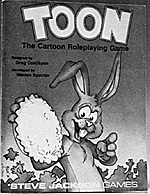
Designed by Greg Costikyan
Developed by Warren Spector
Steve Jackson Games, Inc,
PO. Box 18957, Austin, TX
78760
Release Date: July, 1984
Catalog no. 1203
Price: $8.00
Complexity Beginner
Solitaire Suitability: Low
Rating: ***1/2
If you like to indulge in a streak of silliness, TOON lets you go on a binge. In TOON, you play the cartoon character of your choice, committing mayhem, foolishness, and utter lunacy whenever possible. If, however, your role-playing philosophy demands realism and a consistent universe, omit TOON from your diet. If you're willing to admit to lapses into craziness, the game can be enjoyed every time you play. You'll need comrades though. Like most role-playing games, TOON requires at least two people to play.
The rules system including character sheet and four adventures, called Short Subjects and Feature Film, comes in a 64-page 8.5 x 11 inch booklet. For the $8.00 price, this is a good deal, even though you do have to supply the six-sided dice. The cover with a rabbit holding a cream pie introduces the animated spirit of the game, which is fast-paced, easily learned, and lots of fun.
The rules are simple, well-organized, and include plenty of examples. Characters start with 4 attributes: Muscle, Zip, Smarts, and Chutzpah. From these attributes 23 skills are derived. The skills are listed next to the attribute which modifies them. A player has additional points to allocate among his skilis before his character is put into play. After that, skills are improved by using Plot Points. Plot Points are awarded by the referee (or Animator) for how well you play the character. Skill increases are purchased with Plot Points, not by using the skills. Thus a character could improve certain skills without ever using them and the amount of Plot Points the character has to spend is the result of the Animators arbitrary award.
Mack the Mouse and his cartoon friends are used well to add visual clarification in both the rules and examples. For the beginning player, explanations of role-playing, beliefs and goals, dice, characters, attributes, and skills are provided.
In addition to the basic rules, Superstar rules add refinements that an experienced role- player can adopt right away. Generally, the Superstar rules involve more mechanics, and in some cases, limitations that experienced gamers would expect. A list of Shticks enables characters to acquire some incredible skills while maintaining a balance within the system. Shticks cost more to purchase and more to improve. A careful selection of Skills and Shticks is needed to create a good character--something an experienced player will realize immediately.
TOON is a good introduction to role-playing, The basics of assuming another identity and the mechanics of how to play are very simple at this level. The characters are one-dimensional: the world is superficial with consistency avoided, and the mechanics are simple. in other words, a lot of the things a new player finds frustrating are removed, leaving him with more of a chance to enjoy the game.
This doesn't mean that experienced role-players will not enjoy TOON. In some ways, TOON will be more difficult at first. It's hard to "forget everything you know" and "act before you think. " in other role-playing games, that advice would have you minus a character in very little time. In TOON, adherence to that advice means lots of fun, because TOON works best when you just act crazy.
The Animator is very much responsible for the success of TOON. He has to keep the pace fast, the world suspensful, and the mechanics out of the way This requires at least an experienced gamer if not an experienced referee. The rules do an excellent job of helping the Animator do this. They provide lots of tips and useful advice on how to keep the players moving along.
There even a list of sounds to use to maintain the cartoon feel. These will serve no purpose if the Animator is not as crazy as the players he's running. It will be very hard for a beginning Animator to run the adventure and not get caught up in the fun of the game if things are working well. That would be a mistake. Maintaining control is very important, if the game is not going to devolve into aimless jokes. This is where the Plot Points distribution can work to the detriment of a player if the Animator likes your jokes, you're going to do well, if he doesn't ....
The rules and adventures do a good job of getting the players and Animator in the proper cartoon spirit. The Animator has various tools available to aid him in keeping the silliness manageable. He can erase part or all of a character, enabling him to slow down the horrendous without interrupting the flow of the game. The game encourages the characters to do any zany thing they can come up with, so having an eraser handy is vital.
For the players, TOON is an opportunity to get into serious lunacy. For most gamers, this is easy.
More Reviews
-
Game Review: RuneQuest
Game Review: Star Trek: The Role Playing Game
Game Review: Toon
Game Review: Battle Above the Earth
Game Review: Paranoia
Game Review: Tsathogghua
Game Review: South Mountain (ACW)
Game Review: Shiloh (ACW)
Game Review: Third World War
Game Review: Boots and Saddles ('80s Air Cav)
Game Review: Axis and Allies (WWII)
Game Review: 8th Army: Operation Crusader
Game Review: James Clavell's Shogun
Game Review: King Hamlet
Game Review: Grass
Game Review: Hack 'N' Slash
Back to Table of Contents -- Game News #1
To Game News List of Issues
To MagWeb Master Magazine List
© Copyright 1999 by Dana Lombardy.
This article appears in MagWeb (Magazine Web) on the Internet World Wide Web.
Other military history articles and gaming articles are available at http://www.magweb.com